【英语】情态动词基础练习题
- 格式:doc
- 大小:75.00 KB
- 文档页数:11
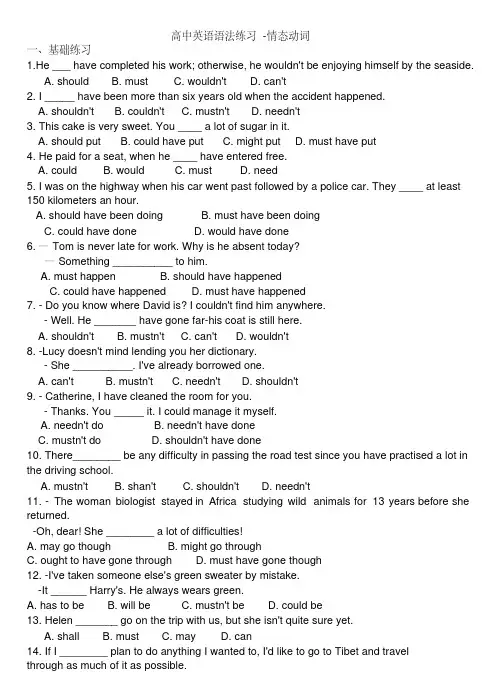
高中英语语法练习-情态动词一、基础练习1.He ___ have completed his work; otherwise, he wouldn't be enjoying himself by the seaside.A. shouldB. mustC. wouldn'tD. can't2. I _____ have been more than six years old when the accident happened.A. shouldn'tB. couldn'tC. mustn'tD. needn't3. This cake is very sweet. You ____ a lot of sugar in it.A. should putB. could have putC. might putD. must have put4. He paid for a seat, when he ____ have entered free.A. couldB. wouldC. mustD. need5. I was on the highway when his car went past followed by a police car. They ____ at least 150 kilometers an hour.A. should have been doingB. must have been doingC. could have doneD. would have done6. — Tom is never late for work. Why is he absent today?— Something __________ to him.A. must happenB. should have happenedC. could have happenedD. must have happened7. - Do you know where David is? I couldn't find him anywhere.- Well. He _______ have gone far-his coat is still here.A. shouldn'tB. mustn'tC. can'tD. wouldn't8. -Lucy doesn't mind lending you her dictionary.- She __________. I've already borrowed one.A. can'tB. mustn'tC. needn'tD. shouldn't9. - Catherine, I have cleaned the room for you.- Thanks. You _____ it. I could manage it myself.A. needn't doB. needn't have doneC. mustn't doD. shouldn't have done10. There________ be any difficulty in passing the road test since you have practised a lot in the driving school.A. mustn'tB. shan'tC. shouldn'tD. needn't11. - The woman biologist stayed in Africa studying wild animals for 13 years before she returned.-Oh, dear! She ________ a lot of difficulties!A. may go thoughB. might go throughC. ought to have gone throughD. must have gone though12. -I've taken someone else's green sweater by mistake.-It ______ Harry's. He always wears green.A. has to beB. will beC. mustn't beD. could be13. Helen _______ go on the trip with us, but she isn't quite sure yet.A. shallB. mustC. mayD. can14. If I ________ plan to do anything I wanted to, I'd like to go to Tibet and travelthrough as much of it as possible.A. wouldB. could C have to D. ought to15. You might just as well tell the manufacturer that male customers_____ not like the design of the furniture.A. mustB. shallC. mayD. need16. -Who is the girl standing over there?- Well, if you ______ know, her name is Mabel.A. mayB. canC. mustD. shall17. Children under 12 years of age in that country______ be under adult supervisionwhen in a public library.A. mustB. mayC. canD. need18. "The interest ______ be divided into five parts, according to the agreement madeby both sides," declared the judge.A. mayB. shouldC. mustD. shall19. -- I'll tell Mary about her new job tomorrow.--You _______ her last week.A. ought to tellB. would have toldC. must tellD. should have told20. I ______ pay Tom a visit, but I'm not sure whether I will have time this Sunday.A. shouldB. mightC. wouldD. could21. --I don't mind telling you what I know.--You ________. I'm not asking you for it.A. mustn'tB. may notC. can'tD. needn't22. --Excuse me, but I want to use your computer to type a report.--You________ have my computer if you don't take care of it.A. shan'tB. might notC. needn'tD. shouldn't23. --Excuse me. Is that the right way to the Summer Palace?--Sorry, I'm not sure, but it ______ be.A. mightB. willC. mustD. can24. --Mum, I've been studying English since 8 o'clock. ________ I go out and playwith Tom for a while?--No, I'm afraid not. Besides, it's raining outside now.A. can'tB. wouldn'tC. may notD. won't25. I often see lights in that empty house. Do you think I _____report it to the police?A. shouldB. mayC. willD. can26. Mr. White_______ at 8:30 for the meeting, but he didn't show up.A. should have arrivedB. should arriveC. should have had arrivedD. should be arriving27. You ________ be tired-you've only been working for an hour.A. must notB. won'tC. can'tD. may not二、提高练习1.--- Shall I tell John about it?--- No, you ______. I’ve told him already.A. needn’tB. wouldn’tC. mustn’tD. shouldn’t2. --- There were already five people in the car, but they managed to take me as well.--- It ______ a comfortable journey.A. can’t beB. shouldn’t beC. mustn’t have beenD. couldn’t have been3. --- Why didn’t you come to see me?--- I ______, but I was too busy yesterday.A. like toB. should like toC. would like to haveD. am going to-behaved gentleman ______ be so rude to a lady.4. You can’t imagine that a wellA. mightB. needC. shouldD. would5. There was plenty of time; she ______.A. mustn’t have hurriedB. needn’t have hurriedC. may not have hurriedD. wouldn’t have hurried6. --- Is John coming by air?--- He should, but ______ not. He likes taking trains.A. mustB. canC. needD. may7. --- ______ it be Li Ping who broke the glass?--- No. It ______ be Wang Hai who did it.A. Could; mayB. Can; canC. May; mustD. Can; must8. When the old man was alive, he ______ sit for hours at the door.A. wouldB. couldC. mustD. might9. Jack, you ______ play with the knife; you ______ hurt yourself.A. won’t; can’tB. mustn’t; mayC. shouldn’t; mustD. can’t; should10. I’ve decided to take the job and I ______ change my mind.A. mustn’tB. can’tC. won’tD. may not11. She ______ into the thick forest alone on such a dark night.A. dares not goB. dares not to goC. dare not to goD. doesn’t dare to go12. My parents never remember my telephone number, and they always ______ look it up.A. mustB. canC. shouldD. have to13. --- Where is Jack? I can’t find him anywhere.--- He ______ his homework upstairs.A. might have doneB. must have doneC. might be doingD. must do14. He ______ you more help, even though he was very busy.A. might have givenB. might giveC. may have givenD. may give15. --- If he ______, he ______ that food.--- Luckily he was sent to the hospital immediately.A. was warned; would not takeB. had been warned; would not have takenC. would be warned; had not takenD. would have been warned; had not taken16. --- I hear you've got a set of valuable Australian coins. ____I have a look ?--- Yes, certainly.A. DoB. MayC. ShallD. Should17. — When can I come for the photos? I need them tomorrow afternoon.。
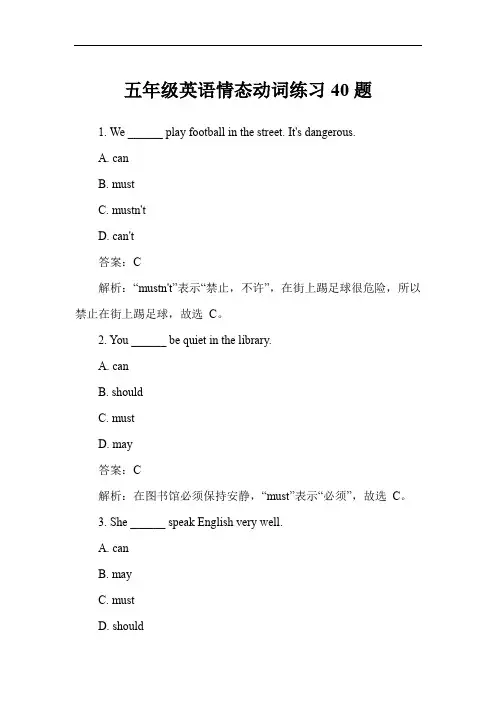
五年级英语情态动词练习40题1. We ______ play football in the street. It's dangerous.A. canB. mustC. mustn'tD. can't答案:C解析:“mustn't”表示“禁止,不许”,在街上踢足球很危险,所以禁止在街上踢足球,故选C。
2. You ______ be quiet in the library.A. canB. shouldC. mustD. may答案:C解析:在图书馆必须保持安静,“must”表示“必须”,故选C。
3. She ______ speak English very well.A. canB. mayC. mustD. should答案:A解析:“can”表示“能够”,她能够把英语说得很好,故选A。
4. We ______ listen to the teacher carefully in class.A. canB. mustC. mayD. should答案:B解析:在课堂上我们必须认真听老师讲课,“must”有“必须”的意思,故选B。
5. They ______ finish their homework on time.A. canB. mustC. mayD. should答案:B解析:“must”表示“必须”,他们必须按时完成作业,故选B。
6. We ______ play football yesterday because it rained. ()A. couldB. couldn'tC. canD. can't答案:B解析:yesterday 表明是一般过去时,根据“because it rained”可知因为下雨不能踢足球,could 是can 的过去式,couldn't 表示“不能”,故选B。
7. She ______ swim when she was five years old. ()A. couldB. canC. couldn'tD. can't答案:A解析:“when she was five years old”是一般过去时,could 表示过去的能力“能,会”,故选A。
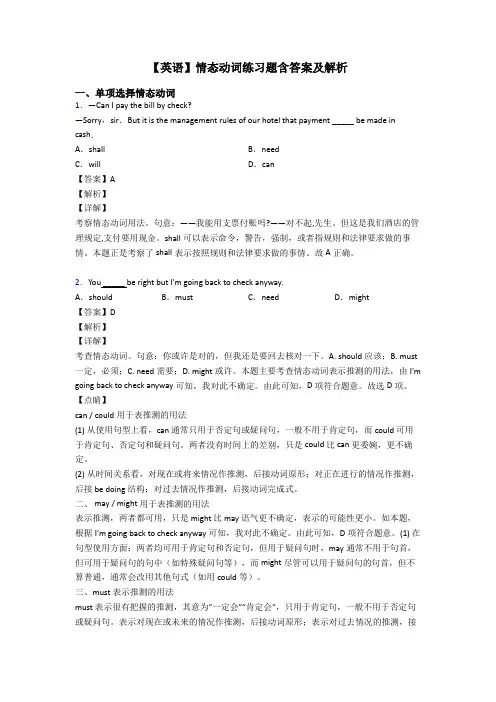
【英语】情态动词练习题含答案及解析一、单项选择情态动词1.—Can I pay the bill by check?—Sorry,sir.But it is the management rules of our hotel that payment _____ be made in cash.A.shall B.needC.will D.can【答案】A【解析】【详解】考察情态动词用法。
句意:——我能用支票付账吗?——对不起,先生。
但这是我们酒店的管理规定,支付要用现金。
shall可以表示命令,警告,强制,或者指规则和法律要求做的事情。
本题正是考察了shall表示按照规则和法律要求做的事情。
故A正确。
2.You _____ be right but I’m going back to check anyway.A.should B.must C.need D.might【答案】D【解析】【详解】考查情态动词。
句意:你或许是对的,但我还是要回去核对一下。
A. should应该;B. must 一定,必须;C. need需要;D. might或许。
本题主要考查情态动词表示推测的用法,由I’m going back to check anyway可知,我对此不确定。
由此可知,D项符合题意。
故选D项。
【点睛】can / could用于表推测的用法(1) 从使用句型上看,can 通常只用于否定句或疑问句,一般不用于肯定句,而could 可用于肯定句、否定句和疑问句。
两者没有时间上的差别,只是could 比 can 更委婉,更不确定。
(2) 从时间关系看,对现在或将来情况作推测,后接动词原形;对正在进行的情况作推测,后接 be doing 结构;对过去情况作推测,后接动词完成式。
二、 may / might用于表推测的用法表示推测,两者都可用,只是 might 比 may 语气更不确定,表示的可能性更小。
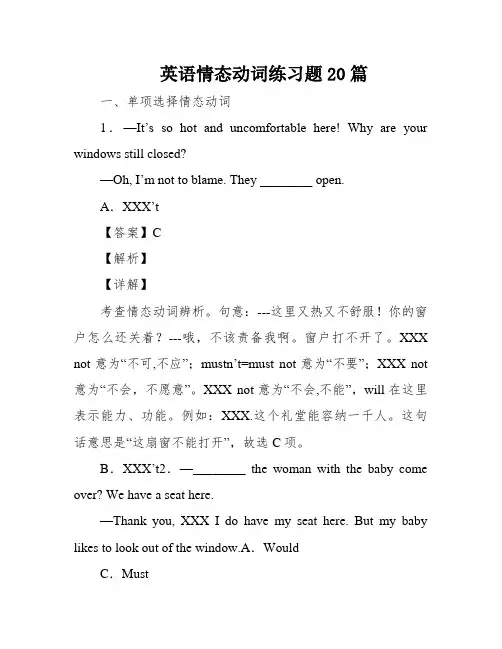
英语情态动词练习题20篇一、单项选择情态动词1.—It’s so hot and uncomfortable here! Why are your windows still closed?—Oh, I’m not to blame. They ________ open.A.XXX’t【答案】C【解析】【详解】考查情态动词辨析。
句意:---这里又热又不舒服!你的窗户怎么还关着?---哦,不该责备我啊。
窗户打不开了。
XXX not意为“不可,不应”;mustn’t=must not意为“不要”;XXX not 意为“不会,不愿意”。
XXX not意为“不会,不能”,will在这里表示能力、功能。
例如:XXX.这个礼堂能容纳一千人。
这句话意思是“这扇窗不能打开”,故选C项。
B.XXX’t2.—________ the woman with the baby come over? We have a seat here.—Thank you, XXX I do have my seat here. But my baby likes to look out of the window.A.WouldC.Must【答案】A【解析】【详解】考查情态动词。
句意:——那位抱小孩的女士,要不来这边吧?这儿有个坐位。
——谢谢,实践上我有坐位的,只是我的孩子喜爱看窗外。
XXX表示婉转的恳求,征求对方的看法,XXX提问一般只用于第一人称,我们常说Shall I.或者XXX;may表示恳求对方允许。
应选A。
【点睛】would的用法1.would最常见的用法是:相对于一个过去时间点的后来“将要”做什么,比如:He said XXX.他说他会在车站接我的。
这句中的would meet是相对于said(过去说)之后要做的事情。
又如:XXX she would have to ask someone for help.她当时想,她得找个人帮忙。
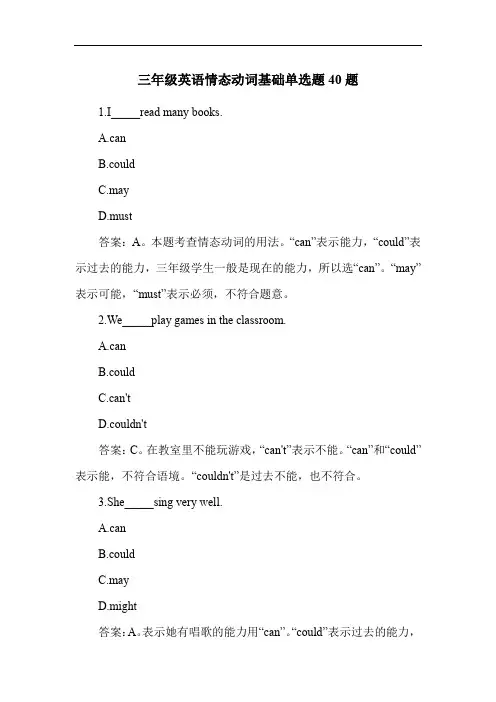
三年级英语情态动词基础单选题40题1.I_____read many books.A.canB.couldC.mayD.must答案:A。
本题考查情态动词的用法。
“can”表示能力,“could”表示过去的能力,三年级学生一般是现在的能力,所以选“can”。
“may”表示可能,“must”表示必须,不符合题意。
2.We_____play games in the classroom.A.canB.couldC.can'tD.couldn't答案:C。
在教室里不能玩游戏,“can't”表示不能。
“can”和“could”表示能,不符合语境。
“couldn't”是过去不能,也不符合。
3.She_____sing very well.A.canB.couldC.mayD.might答案:A。
表示她有唱歌的能力用“can”。
“could”表示过去的能力,“may”和“might”表示可能,不符合题意。
4.They_____draw pictures in art class.A.canB.couldC.mustD.should答案:A。
在美术课上能画画用“can”表示能力。
“could”过去的能力,“must”必须,“should”应该,都不符合。
5.I_____help you with your homework.A.canB.couldC.mayD.might答案:A。
表示我有帮助你做作业的能力用“can”。
“could”过去的能力,“may”和“might”表示可能,不符合。
6.We_____listen to the teacher carefully.A.canB.couldC.mustD.should答案:C。
在学校里必须认真听老师讲课,用“must”。
“can”和“could”表示能力,“should”应该,都不符合。
7.She_____speak English and Chinese.A.canB.couldC.mayD.might答案:A。
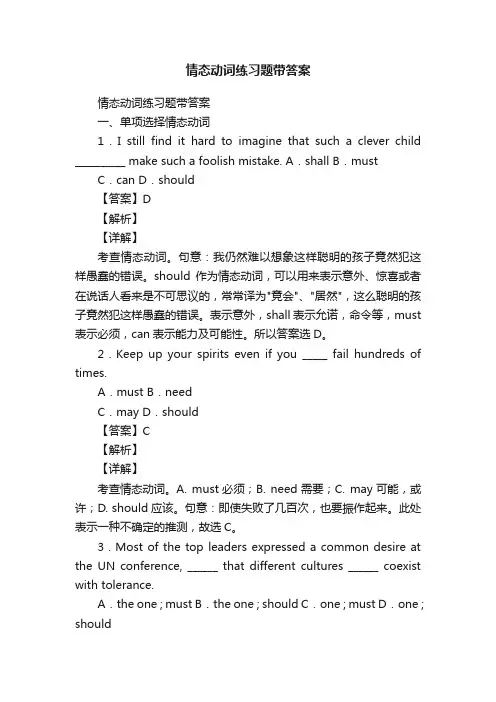
情态动词练习题带答案情态动词练习题带答案一、单项选择情态动词1.I still find it hard to imagine that such a clever child __________ make such a foolish mistake. A.shall B.must C.can D.should【答案】D【解析】【详解】考查情态动词。
句意:我仍然难以想象这样聪明的孩子竟然犯这样愚蠢的错误。
should 作为情态动词,可以用来表示意外、惊喜或者在说话人看来是不可思议的,常常译为"竟会"、"居然",这么聪明的孩子竟然犯这样愚蠢的错误。
表示意外,shall表示允诺,命令等,must 表示必须,can表示能力及可能性。
所以答案选D。
2.Keep up your spirits even if you _____ fail hundreds of times.A.must B.needC.may D.should【答案】C【解析】【详解】考查情态动词。
A. must必须;B. need需要;C. may可能,或许;D. should应该。
句意:即使失败了几百次,也要振作起来。
此处表示一种不确定的推测,故选C。
3.Most of the top leaders expressed a common desire at the UN conference, ______ that different cultures ______ coexist with tolerance.A.the one ; must B.the one ; should C.one ; must D.one ; should【答案】D【解析】【详解】考查替代和情态动词。
句意:大多数高层领导人在联合国大会上表达了一个共同的愿望,即不同的文化应该与宽容共存。
大多数高层领导人在联合国大会上表达了一个共同的愿望,即不同的文化应该与宽容共存。
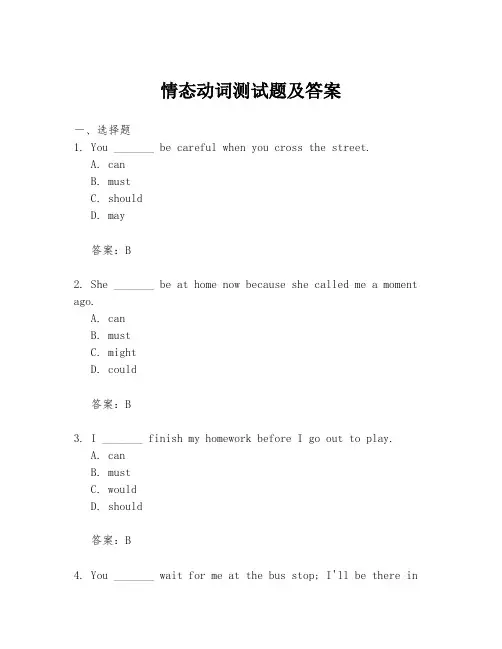
情态动词测试题及答案一、选择题1. You _______ be careful when you cross the street.A. canB. mustC. shouldD. may答案:B2. She _______ be at home now because she called me a moment ago.A. canB. mustC. mightD. could答案:B3. I _______ finish my homework before I go out to play.A. canB. mustC. wouldD. should答案:B4. You _______ wait for me at the bus stop; I'll be there infive minutes.A. needB. mustC. canD. may答案:C5. They _______ have finished their work by now.A. canB. mustC. shouldD. might答案:C二、填空题6. It’s cold outside. You _______ wear a coat.答案:should7. The doorbell rang, _______ it be the postman?答案:could8. _______ you tell me the way to the library?答案:Could9. I _______ go to the party, but I have to finish my report first.A. canB. mustC. wouldD. should答案:C10. _______ I borrow your pen for a moment?答案:May三、改错题11. He can go to the concert, but he must to stay at home.错误:to stay正确:must stay12. She might have finished her work, but I think she should be working now.错误:might have finished正确:may have finished13. You should to call your parents before you leave.错误:to call正确:should call14. I would like to go to the beach, but I can’t afford it.错误:would like正确:could15. They must have been at the meeting, but they were actually at the cinema.错误:must have been正确:could have been四、翻译题16. 他可能已经完成了他的作业。
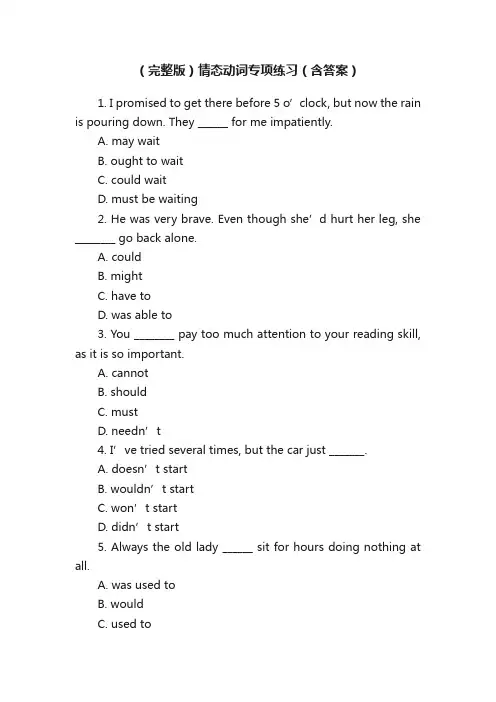
(完整版)情态动词专项练习(含答案)1. I promised to get there before 5 o’clock, but now the rain is pouring down. They ______ for me impatiently.A. may waitB. ought to waitC. could waitD. must be waiting2. He was very brave. Even though she’d hurt her leg, she ________ go back alone.A. couldB. mightC. have toD. was able to3. You ________ pay too much attention to your reading skill, as it is so important.A. cannotB. shouldC. mustD. needn’t4. I’ve tried several times, but the car just _______.A. doesn’t startB. wouldn’t startC. won’t startD. didn’t start5. Always the old lady ______ sit for hours doing nothing at all.A. was used toB. wouldC. used toD. should6. There used to be a small school,___________?A. was thereB. wasn’t itC. usedn’t thereD. usedn’t it7. Our house is on the top of the hill, so in summer the wind _____ be pretty cold.A. mustB. canC. ought toD. need8. Haven’t I told you that you __________ have the ans wer tomorrow morning?A. willB. shallC. shouldD. would9. I’m surprised that he _______ in the match.A. should failB. should have failedC. would have failedD. may have failed10. Better go to see my sick colleague right now, ________I?A. hadn’tB. didn’tC. don’tD. won’t11. Sir, you ______ be hunting deer here, for they are preserved by the government.A. oughtn’t toB. can’tC. won’tD. needn’t12. Sorry I’m late. I ______ have turned off the alarm clock and gone back to sleep again.A. mightB. shouldC. canD. will13. —There were already five people in the car, but they managed to take me as well.— It __________ a comfortable journey.A. can’tB. shouldn’t beC. must have beenD. couldn’t have been14. To be on the safe side, we should fill up the tank now, because we ______ run out of gas on the way.A. canB. wouldC. mightD. should15. ____ three people who travel together, there _____ be at least one who ____ be my teacher.A. Between; can; willB. In; should; couldC. Among; will; mayD. Of; must; can16. —Could you lend me that book you ______ me aboutwhen I telephoned you?—No, I am sorry, I can’t. I gave it to a friend.A. were tellingB. would tellC. had toldD. had been telling17. —We need a person badly to think up such an idea.—_______ the new comer have a try?A. ShallB. MayC. ShouldD. Need18. We ________ so tired. We’ve only been to a party.A. mustn’t have feltB. wouldn’t have feltC. shouldn’t have feltD. couldn’t have felt19. Professor Smith, many students want to see you. __________ they wait here or outside?A. DoB. ShallC. WillD. Would20. —How about paying a visit to Mr. Richardson, our former history teacher?—Good idea. I will e-mail him today so he _____know _________ to expect us.A. shall; whyB. may; whenC. would; whyD. will; how21. —I went to work on foot yesterday, though it _________ cats and dogs.—You __________ by bus. It was likely to get a cold.A. is raining; must have goneB. rained; would goC. was mining; should have goneD. have rained; could have gone22. You ______ pay too much attention to your reading skill, as it is so important.A. cannotB. shouldC. mustD. needn’t23. I told Sally to fix him up with this job, but perhaps I _________ it out for her.A. had to writeB. must have writtenC. should have writtenD. ought to write24. My sister met him at the Grand Theatre yesterday afternoon, so he ________ your lecture.A. couldn’t have attendedB. needn’t have attendedC. mustn’t have attendedD. shouldn’t have attended25. Research findings show we spend about two hours dreaming every night, no matter what we ________ during the day.A. should have doneB. would have doneC. may have doneD. must have done26. —Is there any flight to Tokyo today?— I think there _____, for the weather is too bad.A. mustn’t beB. mightn’t beC. needn’t beD. can’t be27. —I’m told that John had another car accident this morning.— I believe not. He _____ so careless.A. shouldn’t have beenB. wouldn’t have beenC. couldn’t have beenD. mustn’t have be en28. It was playing computer games that cost the boy a lot of time that he __________ doing his lessons.A. might have spentB. ought to have spentC. must have spentD. could have spent29. —I didn’t know you were good friends.—You _______. I have known her since she moved here. You were studying abroad then.A. may haveB. needn’t haveC. couldn’t haveD. must have30. They must have finished the work by the end of last month, __________?A. mustn’t theyB. haven’t theyC. hadn’t theyD. didn’t they31. —I didn’t see her yesterday.— Of course, you _____, because he had gone for a trip.A. can’tB. may not haveC. can’t haveD. mustn’t have32. You ________ phone him if you want to, but you _________. He is sure to phone you.A. may; mustn’tB. have t o; needn’tC. can; doesn’t needD. can; needn’t33. — She must have gone back to the valley.— ______, she _____ have. The entrance to it was nowhere to be found.A. No; mustn’tB. Yes; mightC. Yes; couldD. No; couldn’t34. He _____ full marks, but he was so careless as to make a spelling mistake.A. must have gainedB. can have gainedC. could have gainedD. must gain35. From what you said, she _____ you about it.A. mustn’t have toldB. can’t have toldC. mustn’t tellD. can’t tell36. — You ought to have made an apology to Tom yesterday evening.— Yes, I know I _________.A. ought toB. have toC. should haveD. must have37. —Is there a fog in the evening?—There _______ be. I’ll make a phone call to find it out.A. mustB. wouldC. willD. might38. — _______ he help you with the problem?—Well, though it is very hard, __________ I’ll do what I can to work it out.A. Shall; butB. Can; andC. Must; howeverD. Will; still39. —How is that, Joan?—Yeah, it’s from the boss. She _________ first, whether she likes it.A. shall goB. ought to have goneC. should goD. must have gone40. —Would you like to watch the video, in which you can see foreigners making jiaoji during the Spring Festival?—Sure, it ______ be very interesting.A. shouldB. mayC. canD. will41. —The door was open.—It _________ open. I had locked it myself and the key was in my pocket.A. can not beB. must not beC. can not have beenD. must not have been42. —Where ________ Margaret have put the empty bottles?—She ________ them away. They must be somewhere.A. can; can’t have thrownB. must; needn’tC. must; must have thrownD. cant; must throw43. —Mum, I climbed to get the Teddy Bear from the top of the shelf.—My goodness! You _______ yourself. You ______ do that next time.A. mu st have hurt; mustn’tB. should have hurt; can’tC. may have hurt; mustn’tD. might have hurt; won’t be able to44. —Shall I go and buy more food and drinks for the party?—No, we have prepared a fridge of those. That _______ be quite enough.A. canB. mayC. mightD. ought to45. —Hurry up, Michael! It’s ten to three.—Goodness me! The class_______. I’ll be late again.A. must beginB. may beginC. should have begunD. must have begun46. When he was there, he ____ go to that coffee shop at the street comer after work every day.A. wouldB. shouldC. had betterD. might47. —I hear you have written a novel.—Yes, the book ________ be out in a month or so.A. canB. dareC. shouldD. need48. —How could I thank you enough?—Don’t mention it. Any other man _________ that.A. must doB. could doC. would have doneD. should have done49. —Why aren’t they here yet?—They ________ the bus.A. can have missedB. must be late forC. may have missedD. might be late for50. Mike _______ come to see me I don’t want to go out in case he comes.A. canB. mustC. mayD. will51. The thief ________ in from the kitchen window as the door was closed.A. may climbB. must have climbedC. could have climbedD. should have climbed52. —You didn’t invite Bill?— __________ him too?A. Must I inviteB. Must I have invitedC. Should I inviteD. Should I have invited53. —Why didn’t you attend the lecture yesterday?—I didn’t think that we _______ on Sundays.A. shouldB. ought to haveC. shouldn’t haveD. will have to54. It’s said that there are plenty of hotels in that town. There ______ be any difficulty for you to find somewhere to stay.A. wouldn’tB. mustn’tC. shouldn’tD. needn’t55. —Would you be here to attend the English party this evening?—Yes, we _________.A. shallB. wouldC. willD. must56. On Sundays when I was a child, Father and I _______ get up early and go fishing.A. couldB. wouldC. mightD. should57. —You’d better keep quiet in class.—Sometimes I ________ Yesterday, I was very quiet during my English class.A. wouldB. doC. didD. have58. I lived with my sister this summer and didn’t have to pay rent. So I ______ save most of my salary.A. couldB. wouldC. was able toD. should59. —Look, John’s fallen asleep.— Oh, he _______ too late last night.A. might sit upB. should have sat upC. could sit upD. must have sat up60. —I posted the letter a week ago.—Then they __________ the letter by now. It usually takes four days.A. can have receivedB. must receiveC. should receiveD. ought to have received61. He used to teach in that university and I _________ ride past it on my way to work.A. wouldB. couldC. shouldD. might62. —So you have to leave now.—Yes, I __________.—How nice it would be if you could stay a bit longer!A. have toB. ought toC. doD. have63. He _______ Shanghai, for I saw him talking with the headmaster a moment ago.A. must have gone toB. can’t have gone toC. mustn’t have been toD. can’t have been to64. From what I learn about their hotel, the service and the weather, they _____ their holiday very much.A. wouldn’t have enjoyedB. shouldn’t have enjoyedC. needn’t have enjoyedD. can’t have enjoyed65. It is not like Jack to be unfriendly, so he _________ you when you called.A. can’t have seenB. should not have seenC. must not have seenD. need not have seen66. —Many people in England love to give advice on weather reporting.—Yes, but I think the weather office’s computers _________ be more accurate.A. canB. mustC. ought toD. might67. —The farmers lived near the high way.—________ very noisy.A. It must have beenB. They must beC. That might beD. There must be68. She is too slow. She ________ pass the test, but she __________ too little.A. would; knewB. will; knowsC. would; knowsD. will; knew69. —Mary didn’t turn up last time, did she?—No. She_________. We had changed our plan.A. shouldn’t have comeB. needn’t have to comeC. didn’t need to comeD. needn’t have come70. —They haven’t finished the work up to now.—Well, they________.A. shouldB. should haveC. wouldD. must have71. —Shall I go and buy more fruit for the party?—No, I have already bought 3 baskets. That _________ be enough.A. canB. ought toC. mayD. might72. —Why hasn’t the speaker turned up?—He _________ the flight. I’ll find it out at once.A. must have missedB. might have missedC. would have missedD. could have missed73. I _______ pay Tom a visit, but I am not sure whether I will have time this Sunday.A. shouldB. mightC. wouldD. could74. —Who is the girl standing over there?— Well, if you _____ know, her name is Mabel.A. mayB. canC. mustD. shall75. It has been announced that candidates (考生)________ remain in their seats until all the papers have been collected.A. canB. willC. mayD. shall【答案解析】1.D。
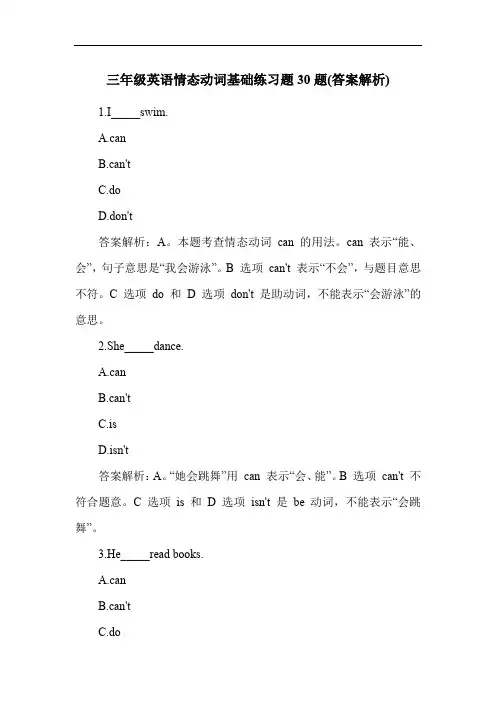
三年级英语情态动词基础练习题30题(答案解析)1.I_____swim.A.canB.can'tC.doD.don't答案解析:A。
本题考查情态动词can 的用法。
can 表示“能、会”,句子意思是“我会游泳”。
B 选项can't 表示“不会”,与题目意思不符。
C 选项do 和D 选项don't 是助动词,不能表示“会游泳”的意思。
2.She_____dance.A.canB.can'tC.isD.isn't答案解析:A。
“她会跳舞”用can 表示“会、能”。
B 选项can't 不符合题意。
C 选项is 和 D 选项isn't 是be 动词,不能表示“会跳舞”。
3.He_____read books.A.canB.can'tC.doD.does答案解析:A。
“他会读书”用can。
B 选项can't 与题意不符。
C 选项do 和D 选项does 是助动词,不能表示“会读书”。
4.We_____play football.A.canB.can'tC.doD.don't答案解析:A。
“我们会踢足球”用can。
B 选项can't 不符合题意。
C 选项do 和 D 选项don't 是助动词,不能表示“会踢足球”。
5.They_____sing songs.A.canB.can'tC.areD.aren't答案解析:A。
“他们会唱歌”用can。
B 选项can't 不符合题意。
C 选项are 和D 选项aren't 是be 动词,不能表示“会唱歌”。
6.The bird_____fly.A.canB.can'tC.isD.isn't答案解析:A。
“鸟会飞”用can。
B 选项can't 不符合题意。
C 选项is 和D 选项isn't 是be 动词,不能表示“会飞”。
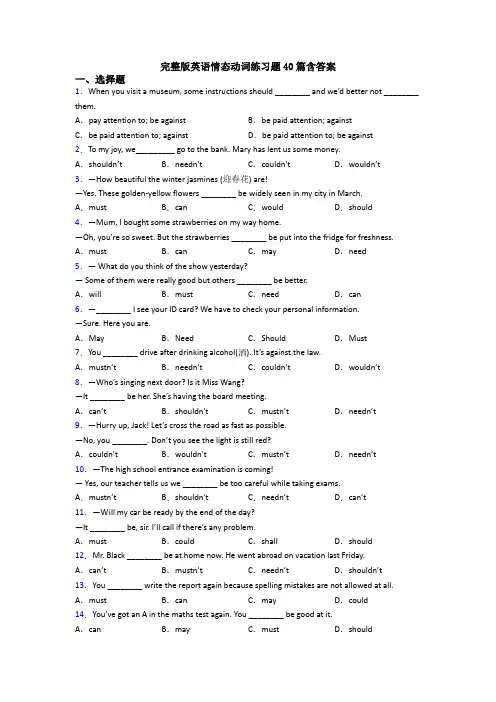
完整版英语情态动词练习题40篇含答案一、选择题1.When you visit a museum, some instructions should ________ and we’d better not ________ them.A.pay attention to; be against B.be paid attention; againstC.be paid attention to; against D.be paid attention to; be against2.To my joy, we_________ go to the bank. Mary has lent us some money.A.shouldn’t B.needn’t C.couldn’t D.wouldn’t 3.—How beautiful the winter jasmines (迎春花) are!—Yes. These golden-yellow flowers ________ be widely seen in my city in March.A.must B.can C.would D.should 4.—Mum, I bought some strawberries on my way home.—Oh, you’re so sweet. But the strawberries ________ be put into the fridge for freshness. A.must B.can C.may D.need5.— What do you think of the show yesterday?— Some of them were really good but others ________ be better.A.will B.must C.need D.can6.—________ I see your ID card? We have to check your personal information.—Sure. Here you are.A.May B.Need C.Should D.Must7.You ________ drive after drinking alcohol(酒). It’s against the law.A.must n’t B.needn’t C.couldn’t D.wouldn’t 8.—Who’s singing next door? Is it Miss Wang?—It ________ be her. She’s having the board meeting.A.can’t B.shouldn’t C.mustn’t D.needn’t 9.—Hurry up, Jack! Let’s cross the road as fast as possible.—No, you ________. Do n’t you see the light is still red?A.couldn’t B.wouldn’t C.mustn’t D.needn’t 10.—The high school entrance examination is coming!— Yes, our teacher tells us we ________ be too careful while taking exams.A.mustn’t B.shouldn’t C.needn’t D.can’t11.—Will my car be ready by the end of the day?—It ________ be, sir. I’ll call if there’s any problem.A.must B.could C.shall D.should12.Mr. Black ________ be at home now. He went abroad on vacation last Friday.A.can’t B.mustn’t C.needn’t D.shouldn’t 13.You ________ write the report again because spelling mistakes are not allowed at all. A.must B.can C.may D.could14.You’ve got an A in the maths test again. You ________ be good at it.A.can B.may C.must D.should15.I ________ hear you clearly. Would you please repeat it?A.mustn’t B.can’t C.needn’t D.shouldn’t16.A lot of online resources ________ be used either by teachers at school or parents at home. A.can B.should C.need D.must17.It’s amazing that the pen ________turn voice into text with few mistakes.A.can B.must C.may D.need18.If you buy your mum an iRobot floor cleaner, she ________ sweep the floor every day. A.can’t B.mustn’t C.needn’t D.shouldn’t 19.— Zoe, what do you think is the greatest advantage of shopping online?— At least I ______ spend much time going from shop to shop.A.shouldn’t B.can’t C.needn’t D.mustn’t 20.—Have you decided to take up teaching as career after graduation?—I ________ go abroad for further education instead. But it depends.A.must B.should C.may D.shall21.—The high school entrance examination is coming!—Yes, our teacher tells us we _______ be too careful while taking exams.A.mustn't B.shouldn't C.needn't D.can't 22.—Ready? Let’s get started, Martin.— Swimming? I just ________ get used to it in winter.A.can’t B.needn’t C.mustn’t D.shouldn’t 23.Dr. Zhong Nanshan once said, "To prevent the spread of this disease, we________never be too careful."A.can B.may C.must D.should 24.Think twice before making a decision, or you __________ get into trouble.A.may B.can't C.shouldn't D.mustn't 25.—________ you give me a hand? I can’t put up the poster by myself.—No problem.A.Could B.Should C.Need D.Must26.Most young people like shopping online because they ________ spend much time going from shop to shop.A.needn’t B.can’t C.mustn’t D.shouldn’t 27.Hurry up, or we ________ miss the beginning of the film.A.should B.must C.may D.have to28.—I must go to school today, ________?—No, you ________.You can go as soon as you get well.A.mustn’t I;needn’t B.needn’t I;needn’tC.mustn’t I;mustn’t D.needn’t I;mustn’t29.—How do you like my new dress?—Well, if I ________ say, it is not suitable for you.A.may B.must C.have to D.should30.— Excuse me, could you tell me where the Nanjing Brocade Museum is?— Go along this road for five minutes. You ________ miss it. It’s a huge building.A.mustn’t B.can’t C.needn’t D.shouldn’t 31.—Why didn’t you tell it to me earlier?— Why ________ I? I want to have my own secret.A.can B.may C.should D.shall32.A hard-working man ________ become a great scientist, but a great scientist ________ be a hard-working man.A.can’t; can B.may not; must C.can’t; must D.may not; can 33.—What is that young lady’s job?—She ________ be a nurse, I’m not sure.A.must B.may C.need D.would34.You _________ smoke here! Look at the sign. It says "No smoking".A.needn't B.mustn't C.can D.may35.—Must I finish all my homework today, Mum?—No, you ________, my dear. You can finish some tomorrow if you like.A.needn’t B.shouldn’t C.can’t D.mustn’t36.We've discussed every detail of this plan and have got everything ready. But still something ________ go wrong. We still have to be very careful.A.must B.should C.would D.may37.— The sandstorm in Beijing is so serious this year.— Yes, I wonder when we ________ worry about the air we breathe.A.can’t B.mustn’t C.needn’t D.shouldn’t 38.Never throw objects from the building. Even a small object ________ cause serious injuries, or death, when dropped from a great height.A.must B.should C.may D.need 39.—Who is singing next door? It sound s like a young girl’s voice.—It _________ be Jane. But she seldom sings English songs.A.need B.must C.may D.can40.—Will Jim come to Yangzhou for a holiday?—He ________come and it depends on how much homework he will have.A.may B.should C.must D.need41.—Is it usually warm in Yancheng in May?—Yes. But it _______ be rather cold sometimes.A.must B.should C.would D.can42.— Is the boy over there Tom? He often wears a jacket like that.— It _______ be him. He is absent from school today.A.needn’t B.shou ldn’t C.mustn’t D.can’t43.You ________ pay too much attention to protecting yourself if you plan to go abroad. A.mustn’t B.can’t C.shouldn’t D.needn’t 44.—Will dad arrive home at 6 o’clock to have dinner with us this evening?— I think he will, but he ________ not. Sometimes he works extra hours.A.can B.must C.need D.may 45.—Seventy dollars for such a dress! You ________ be joking!—I’m serious. It’s made of silk from Hangzhou.A.must B.need C.will D.can46.—Must we stop the Japanese government discharging nuclear waste water (排放核污水) into the Pacific Ocean?—________. Because everyone should protect our earth and it is bad ________ us to eat the polluted seafood and drink the waste water.A.Yes, we can; of B.No, we mustn’t; of C.Yes, we must; for D.No, we needn’t; for 47.Look at the floor, Tom! ________ you watch TV while having a meal?A.Should B.Could C.Must D.May 48.—Excuse me. I haven’t finished reading the book yet. May I keep it a bit longer?— Sorry, you ________. You must return it on time.A.need n’t B.can’t C.won’t D.shouldn’t 49.Cars ________ give way to walkers on some roads in Binhai, or the drivers will be fined. A.may B.will C.can D.must 50.—Suzy described every detail of the accident just now.—Her memory ________ be completely back.A.shall B.need C.must D.could【参考答案】***试卷处理标记,请不要删除一、选择题1.D解析:D【详解】句意:当你参观博物馆时,应该注意一些说明,我们最好不违反它们。
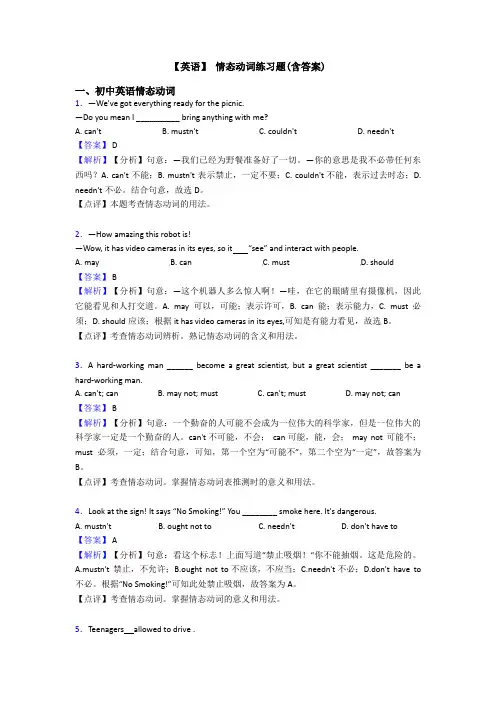
【英语】情态动词练习题(含答案)一、初中英语情态动词1.—We've got everything ready for the picnic.—Do you mean I __________ bring anything with me?A. can'tB. mustn'tC. couldn'tD. needn't【答案】 D【解析】【分析】句意:—我们已经为野餐准备好了一切。
—你的意思是我不必带任何东西吗?A. can't 不能;B. mustn't 表示禁止,一定不要;C. couldn't不能,表示过去时态;D. needn't不必。
结合句意,故选D。
【点评】本题考查情态动词的用法。
2.—How amazing this robot is!—Wow, it has video cameras in its eyes, so it “see” and interact with people.A. mayB. canC. mustD. should【答案】 B【解析】【分析】句意:—这个机器人多么惊人啊!—哇,在它的眼睛里有摄像机,因此它能看见和人打交道。
A. may 可以,可能;表示许可,B. can 能;表示能力,C. must 必须;D. should应该;根据it has video cameras in its eyes,可知是有能力看见,故选B。
【点评】考查情态动词辨析。
熟记情态动词的含义和用法。
3.A hard-working man ______ become a great scientist, but a great scientist _______ be a hard-working man.A. can't; canB. may not; mustC. can't; mustD. may not; can【答案】 B【解析】【分析】句意:一个勤奋的人可能不会成为一位伟大的科学家,但是一位伟大的科学家一定是一个勤奋的人。
【英语】高考英语情态动词题20套(带答案)及解析一、单项选择情态动词1.—Can I pay the bill by check?—Sorry,sir.But it is the management rules of our hotel that payment _____ be made in cash.A.shall B.needC.will D.can【答案】A【解析】【详解】考察情态动词用法。
句意:——我能用支票付账吗?——对不起,先生。
但这是我们酒店的管理规定,支付要用现金。
shall可以表示命令,警告,强制,或者指规则和法律要求做的事情。
本题正是考察了shall表示按照规则和法律要求做的事情。
故A正确。
2.Ann said whenever her father was unhappy he ________ go out and buy something, usually something large and useless.A.should B.couldC.would D.might【答案】C【解析】【详解】考查情态动词。
句意:安说无论什么时候她父亲不高兴的时候,他就会出去买些东西,通常是一些又大又没用的东西。
A. should应该;B. could能;C. would总是,愿意;D. might 可能。
此处表示过去经常习惯做某事,故选C。
3.The accident which left 15 people on board dead ________ if both the angry female passenger and the bus driver had kept calm.A.should have avoided B.should be avoidedC.could have avoided D.could have been avoided【答案】D【解析】【详解】考查“情态动词+完成式”。
英语情态动词练习题50篇含解析一、选择题1.—Would you please help me with my spoken English?—__________. First you should know practice makes perfect.A.That’s right B.No problem C.Quite well D.No, thanks 2.—Are you going to offer some masks and alcohol wet wipes (酒精湿巾) to the people in the village?—________ They are in great need of these things.A.What a shame! B.Why not? C.Why me? D.What's wrong? 3.— I find it difficult to fall asleep before exams. Could you help me?— ___________. We have helped many students with similar problems.A.No problem B.Come on C.Well done D.What a pity 4.—I’m afraid I can’t get good grades in the P.E. exam.—________! Train as much as you can.A.Well done B.Keep trying C.Enjoy yourself D.Be careful 5.—________.—It’s a pleasure.A.Don’t worry about the task B.Thank you for showing me aroundC.Be careful when you travel D.You’d better get up now6.— I am so sorry to keep you waiting for such a long time.— ________.A.Please shut up B.It’s your mistake C.It doesn’t matter D.Don’t explain it 7.—Amazingly, I've managed to finish the project by myself.—___________I told you it was easyA.With pleasure. B.Guess what? C.There you are! D.It doesn’t matter 8.–This box is too heavy for me to carry upstairs.–__________A.You may ask for help B.I’l l give you a handC.Please do me a favor D.I’d come to help9.—I’m sorry. That wasn’t of much help.— ________. In fact, it was most helpful.A.Thanks anyway B.It doesn’t matter C.Of course not D.Sure it was 10.—It’s been a wonderful party. Thank you ver y much?—- ________________.A.With pleasure B.No , thanks C.It’s OK D.I’m glad you enjoyed it .11.— Could you please clean your room?—_________. I’ll do it at once.A.Yes, sure B.Sorry, I can’t C.It doesn’t matter D.Here you are 12.—Our family will go to Hangzhou for a holiday this summer.—________.A.Well done B.I am glad to hear thatC.Best wishes to you D.Have fun13.—Would you like a small or a large bowl of noodles? —_______. I’m very hungry. A.A small bowl B.A large bowl C.Yes, please D.No, thanks 14.—I’m afraid I can’t find the key to the car.—______. I’ll wait for you. We have enough time.A.Hurry up B.All rightC.It is up to you D.Hold your horses15.—I have got a new job as a presenter in the Wenzhou Radio Station!—________.A.Come on B.Good idea C.Congratulations D.All right 16.—TV says there will be a heavy rain tomorrow.—________. I planned to go climbing with my friend.A.Bad luck B.I hope so C.Good idea D.I don’t mind 17.—Sir, this is your order, two chicken hamburgers and a cup of coffee. ________—I’ll have them here.A.For here or to go? B.Something to drink? C.Anything else? D.Is that OK? 18.—I missed the basketball game last Saturday because I had an exam.—________, but it will be repeated on TV.A.Take it easy B.You are lucky C.Th at’s wonderful D.Never mind 19.—Why not take your son to watch the new film A Little Red Flower?—__________.A.Good idea B.No problem C.Good luck D.No way 20.—Do you like cartoons or scary movies?—_______. They can cheer me up.A.Yes, I do B.No, I don't C.Cartoons D.Scary movies 21.—Excuse me, can you give me some water? The cup is empty.—________A.Go ahead. B.My pleasure C.At your service D.You’d better not. 22.—You seem so happy today, Jack.—________? I won the first prize in the singing competition yesterday.A.So what B.How come C.Guess what D.Why not 23.—I’m going hiking this afternoon. Would you like to go with me?—______, but I must finish my homework first.A.Sorry, I don’t B.That’s right C.I’d love to D.Not at all 24.—________. Where’s the ne arest supermarket?—Oh, it’s about 300 meters away, next to a park.A.Thank you B.Excuse me C.Come on D.That’s OK 25.— What do you think of the movie Mr. Bea ?—____. It’s very funny.A.I can’t stand it .B.I don’t mind it C.I love it. D.I hate it. 26.—I p refer to chat online. I’ve got to know many friends on the Internet.—________. Few of them would become your real friends.A.I can’t agree more B.I’m pleased to know thatC.That’s for sure D.That’s not the case27.—Time is up. I have to go now.— ________ ! We don’t have more time to talk.A.That’s cool B.That’s the answer C.That’s a pity D.That’s good news 28.—I find it really unwise to go travelling during May Day holiday.—________! Wherever you go, it’s crowded with cars and people.A.Not exactly B.Forget it C.You said it D.It depends 29.— Why will you take part in the charity walk? You are not good at running at all.— ________. I run to show that I can help others.A.Not exactly B.That’s not the point C.I can’t agree more D.It sounds like a pity 30.—Shall we go to the amusement park right away or the day after tomorrow?—________. Any time will do.A.Excuse me B.Have a good timeC.It’s up to you D.I’m afraid I can’t31.—How do you like coffee, Minnie?—It tastes very terrible. ________.A.I have no idea B.I don’t mind it C.I really can’t stand it D.I can’t afford it 32.— May I have a look at the newspaper China Daily?— Certainly. ________A.Thank you. B.It’s a pity.C.Here you are. D.I’d like to. 33.— Do you think Steve will pass the exam this time?— ________! He spends most of his time playing games on the phone.A.Promise B.No way C.Well done D.No problem 34.—How about putting some pictures into the report?—________ A picture is worth a thousand words.A.I don’t think so.B.Why not?C.Thank you. D.Don’t mention it.35.—How about buying that coat?—________. It’s too expensive. I can’t afford it.A.That sounds good B.No way C.Good idea D.What a pity 36.—I wonder if Tenny is doing well in her new school.—________. She is old enough to look after herself well.A.You’re welcome B.Good luck C.It’s a pity D.No need to worry 37.—I plan to find a part-time job in the coming summer holiday.—________ It will be a totally different experience.A.See you later. B.You’d better not.C.I’m sorry to know that.D.That sounds like fun.38.— Would you mind my turning on the TV? The New Year concert has just begun.— ________. Just go ahead.A.Please don’t B.Better not C.Of course not D.I’m afraid not 39.—All of Mark Twain’s novels are popular.— ________. Especially The Adventures of Tom Sawyer.A.I can’t agree more B.That’s not the case C.That’s not the point D.Don’t mention it 40.—Our school football team has won the first prize in the match!—________A.Have a good time. B.Nice work. C.Never mind. D.Good luck. 41.—We’ll study in different schools next term. I hope you’ll enjoy your time in the new school!—________A.I’ll take your advice. B.The same to you. C.Congratulations!D.It doesn’t matter.42.— The movie Lost in Russia sends a message about the importance of family.— ________. It reminds me of my parents.A.I hope so B.That’s all right C.You bet D.I don’t think so 43.— Are you feeling any better now after taking the medicine?—________. I’m feeling even worse.A.You got it B.Never mind C.Sorry to hear that D.Quite the opposite 44.— I guess you want to play tennis in the park this afternoon.—_______. That’s exactly what I was thinking just now.A.It’s up to you B.Of course not C.You read my mind D.It’s hard to say 45.—Another Friday! Let’s go to see the play tonight.—________ I will book the tickets online.A.My pleasure. B.That’s right.C.Why not? D.Never mind. 46.—I’m so sorry to keep you waiting for me so long.— ________!A.With pleasure. B.Don’t say so C.I don’t think so D.It doesn’t matter 47.—I just got a message from Ms. Yang and she said she would come to our meeting this afternoon.— She always has good ideas.A.Why not? B.What a pity! C.Time is up. D.That’ll be very nice. 48.—Don’t forget to keep safe distance (距离) at least one meter, Mike!—________A.Sorry, I won’t.B.No, I can’t do it.C.Not at all. D.I hope not. 49.—Liz, I’d like to take a week’s holiday.—________. We’re as busy as a bee.A.Go ahead B.With pleasure C.Forget it D.That’s right 50.—I’ll have a chemistry exam tomorro w.—________!A.Well done B.Congratulations C.You’re welcome D.Good luck【参考答案】***试卷处理标记,请不要删除一、选择题1.B【详解】句意:——你可以帮我学习英语口语吗?——没问题。
三年级英语情态动词基础练习题30题含答案解析1.I_____read books.A.canB.couldC.can'tD.couldn't答案解析:A。
can 表示“能够”,符合“I read books”这个表达,我能够读书。
B 选项could 一般用于更加委婉的请求或过去的能力;C 选项can't 表示不能,题干没有否定的意思;D 选项couldn't 是could 的否定形式,一般用于过去不能做某事。
2.She_____sing a song.A.canB.couldC.can'tD.couldn't答案解析:A。
can 表示“能够”,她能够唱歌。
B 选项could 一般用于更加委婉的请求或过去的能力;C 选项can't 表示不能,题干没有否定的意思;D 选项couldn't 是could 的否定形式,一般用于过去不能做某事。
3.We_____play football in the playground.A.canB.couldC.can'tD.couldn't答案解析:A。
can 表示“能够”,我们能够在操场上踢足球。
B 选项could 一般用于更加委婉的请求或过去的能力;C 选项can't 表示不能,题干没有否定的意思;D 选项couldn't 是could 的否定形式,一般用于过去不能做某事。
4.He_____draw pictures very well.A.canB.couldC.can'tD.couldn't答案解析:A。
can 表示“能够”,他能够画得很好。
B 选项could 一般用于更加委婉的请求或过去的能力;C 选项can't 表示不能,题干没有否定的意思;D 选项couldn't 是could 的否定形式,一般用于过去不能做某事。
5.They_____swim in the pool.A.canB.couldC.can'tD.couldn't答案解析:A。
情态动词练习题(含答案)经典一、初中英语情态动词1.— We've ordered too much food. I eat any more.—Never mind. Let' take it home.A. can'tB. mustn'tC. needn'tD. shouldn't【答案】 A【解析】【分析】句意:——我们已经点了太多的食物,我不能再吃了。
——没关系,我们带回家吧。
can't不能;mustn't必须不;一定不要;needn't不必;shouldn't不应该。
根据句意可知选A。
【点评】考查情态动词辨析。
2.All passengers ______ go through safety check before they take a plane.A. canB. mayC. mustD. could 【答案】 C【解析】【分析】句意:所有乘客登机前必须接受安全检查。
A. can能够,表示能力; B. may可以,表示许可; C. must必须;D. could可能,可以。
登机前必须安检。
故选C。
【点评】情态动词词义辨析。
以及can、may、must、could四个词的词义和用法。
3.According to the law, traffic keep to the left in England.A. mayB. mustC. needD. can【答案】 B【解析】【分析】句意:根据法律规定,在英国车辆必须靠左形式。
A.may可以,表示允许;B.must必须,表示要求; C.need需要,表示必要性; D.can能,表示能力。
根据According to the law,可知法律的要求,应是必须的,应用must,故答案为B。
【点评】考查情态动词。
掌握情态动词的常用法。
4.— __________I wear a tie to Janet's birthday party?— No,you needn't. But do remember to bring her a present.A. MustB. ShouldC. NeedD. Can【答案】 A【解析】【分析】句意:——我必须戴领带去参加Jane的生日聚会吗?——不,你不必,但是记住给她带个礼物。
【英语】英语情态动词题20套(带答案)及解析一、单项选择情态动词1.No student ________ go out of school to have lunch without permission of the headteacher. A.might B.mustC.shall D.could【答案】C【解析】【详解】考查情态动词。
句意:未经校长允许,任何学生不得离开学校去吃午饭。
might可能;must一定,必须;shall会,将;could能够。
本句是一条禁令。
shall用于肯定句并且主语是第一、三人称时,表示允诺,警告,劝告等语气。
故选C。
2.While it wasn’t the goal of the trip, I was rewarded with fresh insights, ones that ________ to me during the regular course of business.A.might never happen B.could never have happenedC.should not happen D.needn’t h ave happened【答案】B【解析】【详解】考查虚拟语气。
句意:虽然这并不是这次旅行的目的,但我得到了一些新的领悟,那些领悟在我的日常生活中是本不可能发生的。
此处考查虚拟语气,“我得到新的领悟”发生在过去,故此处是与过去事实相反,应用could/might/would/need/should+have done,“本不可能发生”是could never have happened,故选B项。
【点睛】本题考查“情态动词+have done”的虚拟语气,其常用表达有:could have done本能做某事而未做couldn’t have done不可能做了某事should have done本应该做某事而未做shouldn’t have done本不应该做某事而做了would have done本会某事而未做wouldn’t have done本不会做某事而做了need have done本需要做某事而未做needn’t have done本不必要做某事而做了3.—I don’t really like Janes. Why did you invite him?—Don’t worry. He come. He said he was’t certain what his plans were.A.must not B.need not C.would not D.might not【答案】D【解析】考察情态动词,题干中的he wasn’t certain说明他可能不来,可能来,因此使用不完全否定,might not。
一、选择题1.It's raining._______an umbrella with you when you go out.A.Takes B.Take C.Taking D.Took B解析:B【解析】【详解】句意:下雨了,当你出去的时候,随身携带一把雨伞。
考查祈使句。
take携带,根据所给空后面的when you go out可知,应该用的是祈使句,祈使句肯定形式的构成:动词原形放在句首,故选B。
2.______ talk in the library.A.Don’t B.Not C.Not to A解析:A【解析】【详解】句意:在图书馆不要说话。
此处是祈使句的否定形式,因此在动词原形前加don’t,故为Don’t+动词原形。
故选A。
3.Mike, __________ make any noise, your father is sleeping.A.not B.don't C.won't D.can't B解析:B【解析】【详解】句意:麦克,不要吵闹,你父亲正在睡觉。
考查祈使句。
A. not 不,没有;B. don’t 不,没有;C. won’t 将不会;D. can’t 不能,不会。
A 选项为否定词;B选项为助动词,后面要接动词;C选项为助动词,将来时表将来;D选项为情态动词,表否定推测。
根据否定祈使句用法,应用助动词don’t + 动词原形结构。
A、C、D均不符合,故应选B。
4.Please _____ look outside. Look at the black board.A.not B.don’t C.aren’t D.can’t B解析:B【解析】【详解】句意:请不要往外面看,看黑板。
not不,副词;don’t不要;aren’t不是;can’t不能。
这是祈使句的否定形式,应用don’t,后跟动词原形。
故应选B。
5.Tim,______noisy in the library.A.don’t B.doesn’t C.don’t be D.doesn’t be C解析:C【解析】句意:提姆,不要在图书馆里吵闹。
【英语】情态动词基础练习题一、单项选择情态动词1.Traveling by subway ______ sometimes be quite an adventure, especially during the rush hour.A.must B.can C.shall D.should【答案】B【解析】【详解】考查情态动词。
句意:乘地铁旅行有时可能相当冒险,尤其是在交通高峰期。
A. must必须;一定;B. can能够;可能;C. shall将会;D. should应该;应当。
本句中can表示客观可能性(客观原因形成的能力),故选B。
2.Mr. Baker, some students want to see you. ______ they wait here or outside?A.May B.Should C.Shall D.Will【答案】C【解析】【详解】考查Shall的用法。
句意:贝克先生,有些学生想见你。
他们是在这里等还是在外面等?Shall用于第一、第三人称疑问句中,表示说话人征求对方的意见或向对方请示。
故选C。
【点睛】Shall的用法Shall作为助动词,一般用于第一人称Ⅰ和We,表示一个将来的动作,构成将来时态。
Shall后面接动词原形。
例如:(1)I shall think it over and Let you know my idea.我将考虑一下此事,然后告诉你我的想法。
(2)We shall have a good time in the park.我们在公园里会玩得很高兴的。
常考的特殊用法1. Shall用于第一人称,表示征求对方的意愿。
如:What shall we do this evening?2. Shall用于第一、第三人称疑问句中,表示说话人征求对方的意见或向对方请示。
如:Shall we begin our lesson?When shall he be able to leave the hospital?3. Shall用于第二、第三人称,表示说话人给对方命令、警告、允诺或威胁。
如:You shall fail if you don't work harder. (警告)He shall have the book when I finish reading. (允诺)He shall be punished. (威胁)3.--- Oh, my God! I just missed the last bus back home.--- That’s really bad. I’m sure you ______ it, but you just didn’t hurry up.A.had caught B.could have caught C.could catch D.can catch【答案】B【解析】【详解】考查情态动词+have done结构。
句意:——哦,我的上帝!我刚好错过了回家的末班车。
——这是非常糟糕的。
我肯定你能赶上,但你就是不抓紧。
could have done“本来能做而没有做”。
故选B。
4.Paul did a great job in the speech contest. He many times last week.A.need have practised B.might practiseC.must have practised D.could practise【答案】C【解析】【详解】考查情态动词。
句意:保罗在演讲比赛中表现得很好。
他上星期一定练习了很多次。
must have done是对过去发生的动作最有把握的猜测,意思是“一定”。
故C选项正确。
5.Ann said whenever her father was unhappy he ________ go out and buy something, usually something large and useless.A.should B.couldC.would D.might【答案】C【解析】【详解】考查情态动词。
句意:安说无论什么时候她父亲不高兴的时候,他就会出去买些东西,通常是一些又大又没用的东西。
A. should应该;B. could能;C. would总是,愿意;D. might 可能。
此处表示过去经常习惯做某事,故选C。
6.It is really cold and the ground is wet; it ________ have rained last night.A.might B.mustC.can D.should【答案】B【解析】【详解】考查情态动词辨析。
句意:天气很冷而且地面是湿的,昨晚一定下了雨。
根据上文the ground is wet可知,“昨晚下了雨”是肯定的,故用must have done“必定做了……”表示对过去十分有把握的推测,故选B。
【点睛】must have done用法辨析must have done:表示对过去的肯定的逻辑推测,推定某件事情、动作或状态可能在过去发生过(存在过)。
He must have been a doctor, for he knows medicine so well. 他过去肯定是一位医生,他对医学如此了解。
Somebody must have stolen the ring. 肯定有人偷了这枚戒指. [该句所推断的偷窃动作发生在过去.]The temperature must have dropped to below zero last night, because the water is frozen all over.昨夜的温度肯定降到零度以下,因为水都冻住了。
如果“must + have + 过去分词”句型与by now连用,还可以表示对现在完成的动作和状态的肯定推测,但实质上还是指所推测的过去的动作。
例如:They started early this morning; they must have arrived by now. 他们今晨很早就出发了,现在肯定已经到了。
中国学生的常见病句是:They...; they certainly have arrived.病句的句义是“他们当然已经到达了。
”(这不是对过去的肯定推测,而是断定动作已经完成。
)7.---He was satisfied with the result, wasn't he?---No. It was so difficult that he __________have passed it.A.shouldn't B.mustn'tC.couldn' t D.wouldn't【答案】C【解析】【详解】考查情态动词。
A. shouldn't 不应该;B. mustn't禁止,不允许;C. couldn' t 不可能;D. wouldn't不会。
句意:---他对结果很满意,是吗? ---不。
考试太难了,他不可能通过。
固定结构:couldn' t have done“不可能做某事”,此处是对过去事情有把握的否定推测。
故选C。
【点睛】情态动词+ have done结构:1.“must + have + 过去分词”表示对过去发生的事情或状态进行推测,语气比较坚定,通常只用于肯定句.如:It must have rained last night,for the ground is wet.2.“can / could + have + 过去分词”表示对过去某种情况的怀疑或不确定.can和could一般用于否定句和疑问句,could的语气较can弱.如:He can't have finished the work so soon.3.“m ay / might + have + 过去分词”表示对已发生的动作或存在的状态进行不肯定的推测,might的语气比may弱一点.这种结构主要用于肯定句和否定句,疑问句改用can或could.如:They may not have known it beforehand.4.“need + have + 过去分词”表示过去做了不必做或不需要做的事情,或过去做某事纯属多余.如:I needn't have bought so much wine—only five people came.5.“shoul d / ought to + have + 过去分词”表示过去本该做某事但没做,其否定式表示过去不该做某事但做了,这种句式含有不满或责备之意,ought to的语气比should强一些.如:You ought to / should have studied harder.你本应该更努力学习的.(但没有)He oughtn't to / shouldn't have done that.他本来就不该做那件事.(可是做了)6.“would + have +过去分词”表示对过去的某种情况进行猜测,或本来要做某事却因某种原因未做成,通常用来说明某一情况,但不像用should或ought to那样含有责备之意.如:I guess the poet would have been about twenty when she wrote her first poem.Another worker wouldn't have acted like that.8.Days later, my brother called to say he was all right, but _______say where he was. A.mustn’t B.shouldn’t C.wouldn’t D.mightn’t【答案】C【解析】考查情态动词。
句意:“数天后,我弟弟打电话说他很好,但不肯告诉我他在哪里。
”mustn’t“禁止”;shouldn’t“不应该”;wouldn’t“不情愿”;mightn’t“不可能”。
9.—What’s wrong with you?—Oh, I am sick. I ________ so much ice cream just now.A.shouldn’t e at B.mustn’t eatC.couldn’t have eaten D.shouldn’t have eaten【答案】D【解析】【详解】考查情态动词和虚拟语气。
句意:——你怎么了?——我生病了,我刚才不应该吃那么多冰激凌。